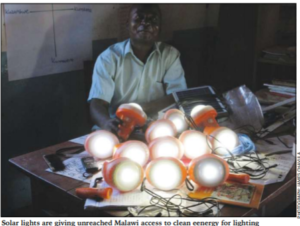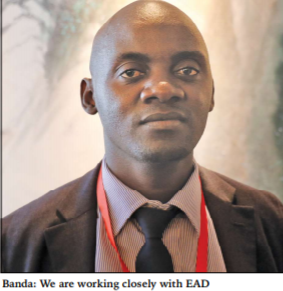Fyson Nanyewe, 31, sells torches and solar lamps at Bvumbwe Trading Centre in Thyolo and Chitakale in Mulanje. When the country was experiencing 36-hour blackouts two years ago, he saw an opportunity to make more money. “Business is in my blood,” he says. “Every week, my father used to travel to Nsanje to order dry fish for sale at Chinakanaka Trading Centre in Mulanje.
So, when people were complaining about blackouts, I stopped selling cooking oil, tomatoes, maize seed and other commodities.” Nayewe runs his business in busy rural trading centres that welcome multitudes from villages without electricity.

The country’s worst blackouts gave the minority connected to the grid a glimpse of the slowdowns faced by 90 percent of the country’s population not reached by Electricity Supply Corporation of Malawi (Escom). Dr Maxon Chitawo, head of Mzuzu University’s Centre for Energy Studies, says: “Expanding energy sources is a game changer in ensuring universal access to sustainable energy in line with the 2030 global goals.
“Lately, Malawi has been experiencing long hours of blackouts and short hours of electricity supply that is neither reliable nor sustainable. If we don’t do something about this, our children will question our integrity.” Chitawo participated in mordenising the 1981 National Energy Policy to ensure everyone has access to reliable, clean, affordable energy by 2030.
The revised edition calls for diversification of energy sources—including solar, wind, hydro and geothermal power—to end energy poverty. However, the census shows only 11 percent of the population has access to electricity, with six percent using solar.
In fact, it shows, over half of the nation uses the lamps sold by Nanyewe for lighting. “I started with a small capital of about K20 000, but discovered it was big business. I used to sell 20 lamps a day before the market got saturated and blackouts faded,” he says.
Currently, Nanyewe’s family owns two shops at Chitakale, an irrigation farmland and a plot where a house is under
construction. “I put money in my pocket by giving light to people yearning for electricity. When people see these lights at work, they come to buy from me,” he says.
From his shops, the low demand for solar solutions in the country play out as sales of the torches powered by dry
sells keep rising. “Most buyers prefer torches to solar lamps,” he says. “The most expensive torch costs less than the cheapest lamp recharged using the sunlight,” he says.
After sunset, both Chitakale and Bvumbwe become a galaxy of the lamps made in China. Nanyewe procures them from Limbe in Blantyre. The lamps mostly pouring in through Tanzania have displaced candles and paraffin lamps traders once used for shinning a light on their commodities and earnings.
To the men and women putting the widespread source of energy for lighting to productive use, the switch from candles and paraffin puts an end to smelly smoke and fire accidents associated with bare flames.But there are rising concerns over the durability of the famous lamps.
Environmentalists and energy activists are worried with fast-piling waste resulting from what could be a desperate search for clean energy ”. Renewable’N’Able Malawi (Renama) advocacy officer Kenneth Mtago states: “The shift is not as beneficial as people think. When you talk about 53 percent of the population using battery for lighting, we are saying Malawians are using lamps that result in waste the country cannot handle presently.
“The country lacks policies and plants to sustainably handle the e-waste, including flat dry cells and discarded torches that can no longer be used.”
In an interview, Department of Energy Affairs spokesperson Saidi Banda said there are various projects funded by Malawi Rural Electrification Programme (Marep), World Bank and United Nations to increase the penetration of solar energy.

“Government also removed import duty for solar power products. We are working closely with Environmental Affairs Department [EAD] in all our products to have an environment management plan for wastes and other pollutants,” he says. In an interview, director of environmental affairs Taonga Mbale-Luka said the energy mix is one of the major sources of waste, but “EAD is working with Malawi Communications Regulatory Authority to develop guidelines for e-waste management”.
A Macra report shows “sound government policies, regulations and strategies are indispensable” to avert environmental and public health problems caused by improper handling of electric and electronic waste, especially mobile phones and television.
However, energy appliances are quickly joining the queue, with most Malawians settling for cheap technologies. As half of Malawians using battery-based lamps, energy activists bemoan that unscrupulous traders are using the duty waiver to flood the market with fakes instead of solar appliances that guarantee Malawians access to reliable, clean and sustainable energy.
In Dedza and Salima, Community Energy Malawi (CEM), with funding from Scotland, is senstising Malawians to always buy energy appliances from reputable shops that offer warranty so that they can reclaim or seek recourse when the accessories breakdown. CEM director Edgar Bayani says the rush for cheap lamps and solar appliances show an unmet demand for clean energy service providers need to build on to deliver quality and affordable solutions that work.
And Nanyewe says: “Sometimes, I receive an unhappy customer complaining about a faulty appliance. I don’t feel good because it means they didn’t get value for their money.”
Source: The Nation_Nation on Sunday_August 18, 2019_by James Chavula-Staff Writer
